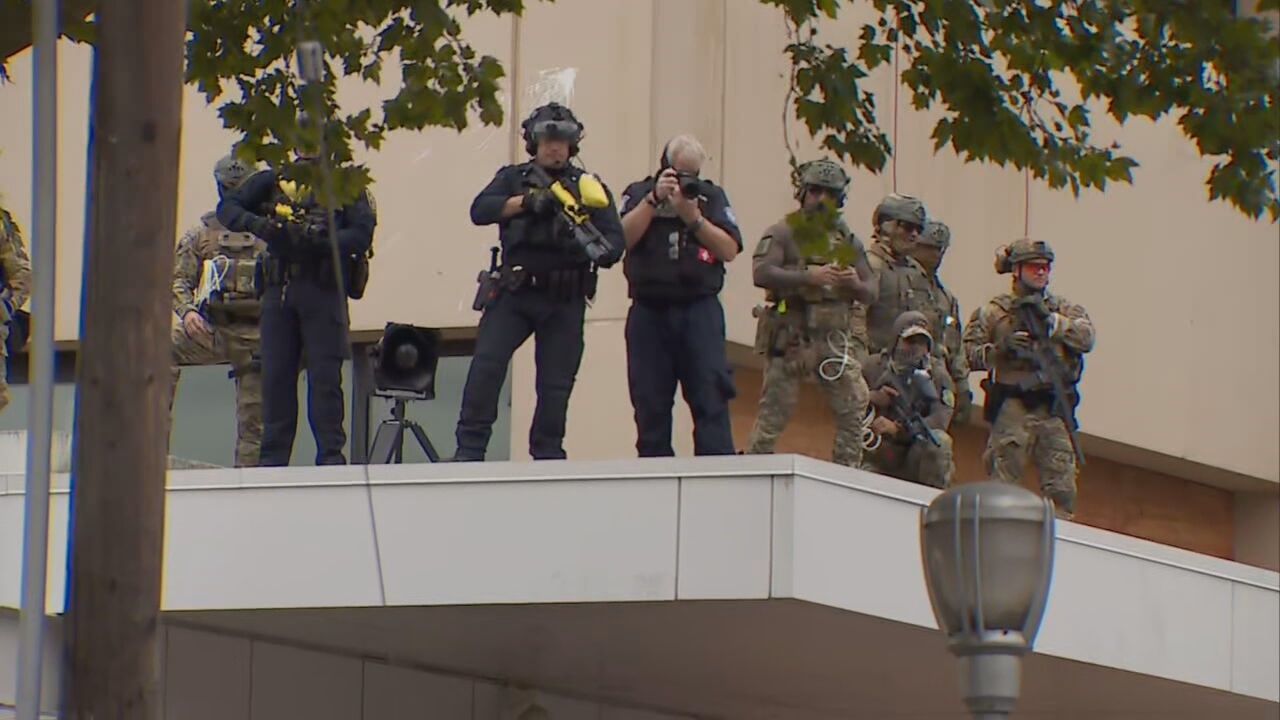PORTLAND, Ore. (KATU) — Another pause on the deployment of the National Guard into Portland comes Tuesday evening as judges for the 9th Circuit Court of Appeals voted to have a larger panel of judges look at the debate over whether President Trump can deploy the Guard as Oregon’s lawsuit plays out.
A panel of eleven judges will now decide whether the Trump administration has the authority to deploy the National Guard during the legal proceedings.
Until they come to a decision, the National Guard cannot come into Portland.
This legal battle started almost a month ago, when President Donald Trump announced the deployment of the National Guard into Portland.
On his Truth Social media account, the president said the city was “war ravaged.” The president also authorized “full force” when it comes to fighting Immigration and Customs Enforcement (ICE) facilities that are under attack by Antifa. Oregon immediately sued over the deployment and argued it wasn’t lawful.
Oregon Attorney General Dan Rayfield asked the judge hearing the case to prevent the Guard from deploying as the court decided whether the deployment was lawful. A few weeks ago, a federal judge — Judge Karin Immergut — granted that requested from the city and state and approved a Temporary Restraining Order – also known as a pause – on the deployment of the Guard.
READ ALSO | Troop deployment to Portland delayed as appeals court considers review
Since then, the federal government has been arguing that federal officers at the ICE facility in South Portland are under attack, while the City of Portland and the State of Oregon have been arguing that officers have control of the situation.
The Trump Administration appealed the district judge’s restraining order to the 9th Circuit and argued that the President should be able to deploy the Guard as the legal debate played out in court. Earlier this month, a three-judge panel sided with President Trump on that question and threw out the restraining order.
Then, a judge on that panel and Oregon requested a broader review by 9th Circuit judges.
That review is “En Banc” because requires the approval of a majority of the Circuit’s 29 active judges. A majority voted to do so Tuesday and vacated the three-judge ruling that sided with the Trump Administration.
“If the 9th Circuit decides first that they’re going to take the case ‘en banc,’ they may just decide to keep the TRO in place,” said Lewis & Clark Law Professor Tung Yin.
Professor Yin emphasized the significance of a decision to hear the case en banc.
“You’re calling an eleven-judge panel to take the time to review the work of three of their colleagues. And that investment of time and resources is only worth it if the case is of enough significance,” said Yin.
READ ALSO | How inflatable costumes ballooned at rallies due to a Portland protester’s frog outfit
The State of Oregon and the City of Portland have been arguing that Portland does not need additional federal protection.
“We believe, as Judge Immergut originally ruled, that the president doesn’t have the authority to federalize the National Guard. We don’t believe the facts on the ground substantiate those rulings,” said Attorney General Dan Rayfield.
On the other hand, the Trump administration has been arguing that Portland Police officers have not been doing enough to protect federal officers who work at the ICE facility and say Title 10 gives the President the authority to federalize and deploy a state’s National Guard.
The legal question over whether the President has the legal authority to do so will be settled in a federal district courtroom this week. Judge Immergut set a three-day trial on the deployment that starts Wednesday.
Oregon argues the deployment is unlawful, but the President argues federal law gives him the authority to federalize the National Guard if there’s a rebellion, invasion, or the President is unable to enforce federal law with regular federal forces. Hos administration said the situation in Portland prevents the federal government from enforcing federal law.
KATU will stay on top of the trial and Judge Immergut’s ruling.

